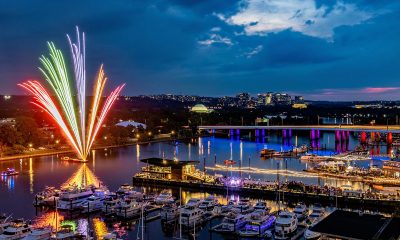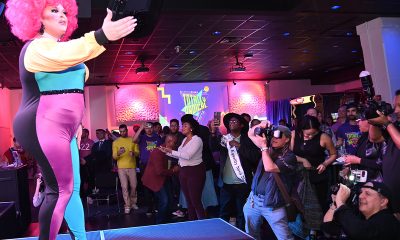Local
Record turnout for Pride
‘Wonderfully diverse’ crowd defies heat, humidity
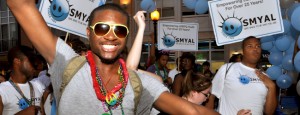
Capital Pride’s parade June 12 featured 175 contingents — the most ever for the event. (Washington Blade photo by Michael Key)
A record-breaking 175 contingents in last weekend’s Capital Pride parade and about 250,000 people at the street festival the next day showed the world how “wonderfully diverse we are as a community,” according to the event’s lead organizer.
Dyana Mason, executive director of Capital Pride Alliance, the non-profit group that organized Washington’s 35th annual LGBT Pride events, called the festivities a “great success.”
“It was wonderfully diverse and had a true cross section of our community,” she said. “It was just wonderful to see everybody from Results Gym to Rainbow Families D.C. to faith communities to the leather contingent. Everybody was there and just being themselves.”
As in past years, the parade’s lead contingent was the lesbian motorcycle group Dykes on Bikes. And a short distance behind them, a contingent of the city’s elected officials joined the parade.
Among them were Mayor Adrian Fenty and his chief rival in the September Democratic primary, City Council Chairman Vincent Gray.
Others included D.C. Congressional Del. Eleanor Holmes Norton and gay D.C. Council members David Catania (I-At Large) and Jim Graham (D-Ward 1), who also are up for re-election this year.
They were joined by Council members Phil Mendelson (D-At Large), Kwame Brown (D-At Large), Jack Evans (D-Ward 2), Mary Cheh (D-Ward 3) and Tommy Wells (D-Ward 6).
Also marching in the parade was former D.C. Parks & Recreation director and gay City Council candidate Clark Ray, who is challenging Mendelson in the September primary.
The politicians, including Fenty and Gray, appeared to be well received as they passed large crowds along a parade route that stretched from 24th and P streets, N.W., around Dupont Circle to the gay enclave along 17th Street.
From there, the parade turned east on P Street, where it passed the official reviewing stand in front of the Whole Foods supermarket near 15th and P streets before ending on 14th Street at Thomas Circle.
The politicians — all of whom are strong supporters of LGBT civil rights — were quickly followed by colorful floats carrying performing drag queens, shirtless male swim team members, gym enthusiasts riding exercise machines, and country western dancers performing the two-step.
Capital Pride officials identified certain contingents as winners of Capital Pride’s annual parade awards: Ziegfeld’s/Secrets nightclub took the Cher Award for Best Theme/Energy; Results Gym captured the Tina Turner Award for Best Float; D.C.’s Different Drummers won the Nancy Sinatra Award for Best Marching Contingent; G Worldwide Resorts earned the Dame Edna Award for Best Visiting Contingent; and Fuego gay bar received the Liberace Award for Most Outrageous.
Also receiving loud applause and cheers along the parade route were the contingents and cars carrying this year’s Capital Pride heroes and super heroes, who were selected for their longtime support for LGBT-related causes.
Among them was Deacon Maccubbin, the former owner of Lambda Rising bookstore who is credited with initiating and organizing the city’s first annual LGBT Pride celebration in 1975.
For many activists, the parade’s route along 17th Street between R and Q streets, N.W., had a special significance this year. On June 10, three days before the parade kick-off, Fenty led a ceremony naming the section of 17th Street between R and Q streets Frank Kameny Way after the nationally recognized D.C. gay civil rights leader.
The ceremony included the unveiling of a newly installed street sign bearing the name Frank Kameny Way, which was visible to parade goers. The street-naming came about through an executive order issued by Fenty.
Kameny, who is credited with founding the city’s gay civil rights movement in the late 1950s, spoke at the ceremony, saying that he could never have predicted the advances in LGBT rights since he was fired in 1957 from his job as a civilian astronomer with the Army Map service because of his sexual orientation.
Joining Fenty in the street naming ceremony was Jack Evans, the Ward 2 Council member whose district includes the newly designated Kameny Way, and gay ANC Commissioner Mike Silverstein, who was among the Dupont Circle ANC commissioners that formally requested the street’s designation.
Also speaking at the ceremony was John Berry, the gay director of the U.S. Office of Personnel Management. Berry noted that OPM’s predecessor agency, the U.S. Civil Service Commission, was the agency that fired Kameny more than 50 years ago for being gay.
“Frank is the perfect storm,” Berry said. “The wall of resistance that he encountered when he challenged his dismissal back in 1957 would have been insurmountable to most people. With no more support than his own brilliant mind and his own powerful lungs, he faced down the United States government.”
Berry noted that over the ensuing decades, Kameny played a key role in guiding the LGBT civil rights movement through battles that ended the government’s ban on civilian gay employees, ended the psychiatric and psychological professions’ classification of homosexuality as a mental disorder, and lifted the government’s ban on issuing security clearances to gay federal employees and contract workers.
“Frank, for every one of us who walk this street, and I walk it daily, your name up here is going to remind us of the power of one person, the power of persistence,” Berry said. “You have changed the world for the better.”
But on the day of the parade, Fenty and other parade goers passing along 17th Street were greeted by another type of sign: professionally printed poster-sized placards bearing the message “Fenty is M.I.A.”
Gay Democratic activist Lane Hudson, who is backing Gray in the mayor’s race, said he and others had the signs made and attached them to light poles along the parade route on 17th Street and along the section of P Street where the parade reviewing stand was located.
Hudson said the placards were intended to deliver a message to parade participants that Fenty has been “missing in action” on a number of LGBT-related issues by not speaking out or meeting with members of the community to address those issues. Anti-LGBT hate crimes, LGBT youth matters and the HIV/AIDS fight were among the issues cited by the signs as issues to which Fenty is not devoting enough attention.
Fenty backers dispute those assertions, though, saying the mayor has extensively addressed those issues during his more than three years in office.
The signs Hudson placed on the light poles list a website for obtaining more information on the subject, but it wasn’t operational earlier this week. Hudson said he planned to activate the site soon.
Capital Pride Alliance President Michael Lutz said the June 13 Capital Pride street festival, held along Pennsylvania Avenue, N.W., between Third and Seventh streets, also appeared to have attracted an unprecedented number of groups, businesses and vendors. Literature released by Capital Pride shows nearly 250 booths lining Pennsylvania Avenue and several side streets.
Among the businesses setting up booths were SunTrust Bank, the Spy Museum, Verizon Wireless, America Online, the New York Times, and the Washington Nationals Baseball Club. Dozens of local and national LGBT organizations also had booths, with many promoting their latest programs and projects.
The intense heat and humidity throughout the day of the street festival was interrupted briefly as rain showers fell for less than five minutes.
Mason credited drag performer Destiny B. Childs with keeping the entertainment going and the crowd pleased from the festival’s main stage during the rain. With the U.S. Capitol as a backdrop looming above the stage, Childs, whose legal name is Richard Legg, staged a show “that was really something to see,” Mason said.
Country western singer Chely Wright, the festival’s headliner performer, closed the program on the main stage to cheering fans. Wright, who came out as lesbian earlier this year in People magazine, recently completed a new album and is promoting an autobiography.
District of Columbia
Reenactment of first gay rights picket at White House draws interest of tourists
LGBTQ activists carry signs from historic 1965 protest

About 30 LGBTQ activists formed a circular picket line in front of the White House Wednesday afternoon, April 17, carrying signs calling for an end to discrimination against “homosexuals” in a reenactment of the first gay rights protest at the White House that took place 59 years earlier on April 17, 1965.
Crowds of tourists looked on with interest as the activists walked back and forth in silence in front of the White House fence on Pennsylvania Avenue. Like the 1965 event, several of the men were dressed in suits and ties and the women in dresses in keeping with a 1960s era dress code policy for protests of the Mattachine Society of Washington, D.C., the city’s first gay rights group that organized the 1965 event.
Wednesday’s reenactment was organized by D.C.’s Rainbow History Project, which made it clear that the event was not intended as a protest against President Joe Biden and his administration, which the group praised as a strong supporter of LGBTQ rights.
“I think this was an amazing event,” said Vincent Slatt, the Rainbow History Project official who led efforts to put on the event. “We had twice as many that we had hoped for that came today,” he said.
“It was so great to see a reenactment and so great to see how far we’ve come,” Slatt said. “And also, the acknowledgement of what else we still need to do.”
Slatt said participants in the event who were not carrying picket signs handed out literature explaining the purpose of the event.
A flier handed out by participants noted that among the demands of the protesters at the 1965 event were to end the ban on homosexuals from working in the federal government, an end to the ban on gays serving in the military, an end to the denial of security clearances for gays, and an end of the government’s refusal to meet with the LGBTQ community.
“The other thing that I think is really, really moving is some of the gay staff inside the White House found out this was happening and came out to greet us,” Slatt said. He noted that this highlighted how much has changed since 1965, when then President Lyndon Johnson’s White House refused to respond to a letter sent to Johnson from the Mattachine Society explaining its grievances.
“So now to have gay people in the White House coming out to give us their respects and to say hello was especially meaningful to us,” Slatt said. “That was not expected today.”
Among those walking the picket line was longtime D.C. LGBTQ rights advocate Paul Kuntzler, who is the only known surviving person who was among the White House picketers at the April 1965 event. Kuntzler said he proudly carried a newly printed version of the sign at Wednesday’s reenactment event that he carried during the 1965 protest. It stated, “Fifteen Million Homosexuals Protest Federal Treatment.”
Also participating in the event was Japer Bowles, director of D.C. Mayor Muriel Bowser’s Office of LGBTQ Affairs. Bowles presented Slatt with a proclamation issued by Bowser declaring April 17, 2024, Mattachine Society Day in Washington, D.C.
“Whereas, on April 17, 1965, the Mattachine Society of Washington courageously held the nation’s inaugural picket for gay rights, a seminal moment in the ongoing struggle for LGBTQIA+ equality in the United States, marking the genesis of public demonstrations advocating for those rights and paving the way for Pride Marches and Pride celebrations worldwide,” the proclamation states.
About 30 minutes after the reenactment event began, uniformed Secret Service agents informed Slatt that due to a security issue the picketers would have to move off the sidewalk in front of the White House and resume the picketing across the street on the sidewalk in front of Lafayette Park. When asked by the Washington Blade what the security issue was about, one of the Secret Service officers said he did not have any further details other than that his superiors informed him that the White House sidewalk would have to be temporarily cleared of all people.
Participants in the event quickly resumed their picket line on the sidewalk in front of Lafayette Park for another 30 minutes or so in keeping with the 1965 picketing event, which lasted for one hour, from 4:20 p.m. to 5:20 p.m., according to Rainbow History Project’s research into the 1965 event.
Although the LGBTQ picketers continued their procession in silence, a separate protest in Lafayette Park a short distance from the LGBTQ picketers included speakers shouting through amplified speakers. The protest was against the government of Saudi Arabia and organized by a Muslim group called Al Baqee Organization.
A statement released by the Rainbow History Project says the reenactment event, among other things, was a tribute to D.C.-area lesbian rights advocate Lilli Vincenz, who participated in the 1965 White House picketing, and D.C. gay rights pioneer Frank Kameny, who founded the Mattachine Society of Washington in the early 1960s and was the lead organizer of the 1965 White House protest. Kameny died in 2011 and Vincenz died in 2023.
The picket signs carried by participants in the reenactment event, which were reproduced from the 1965 event, had these messages:
• “DISCRIMINATION Against Homosexuals is as immoral as Discrimination Against Negroes and Jews;”
• “Government Should Combat Prejudice NOT PROMOTE IT”
• “White House Refuses Replies to Our Letters, AFRAID OF US?
• “HOMOSEXUALS Died for their Country, Too”
• “First Class Citizenship for HOMOSEXUALS”
• “Sexual Preference is Irrelevant to Employment”
District of Columbia
Organizers announce details for D.C. Black Pride 2024
Most events to take place Memorial Day weekend at Westin Downtown
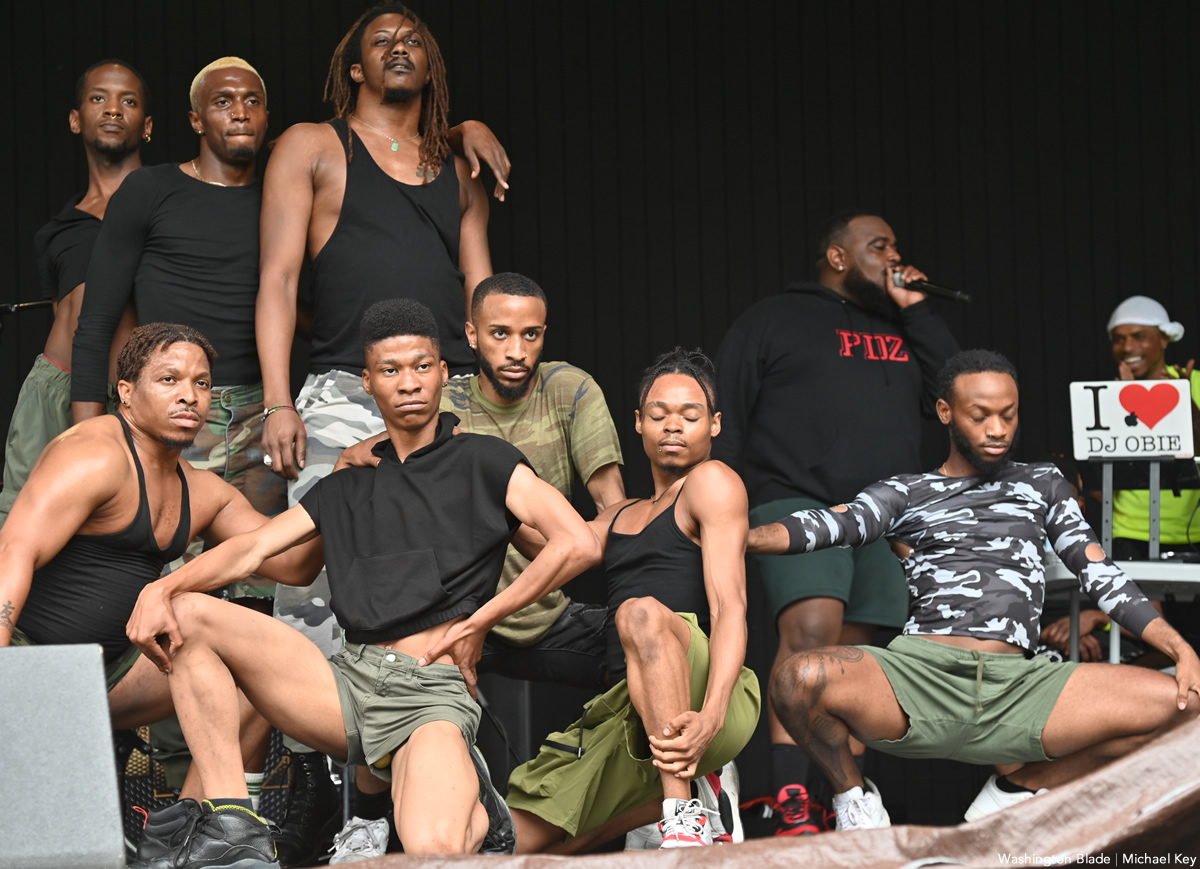
The Center for Black Equity, the organizer of D.C. Black Pride, the nation’s first and one of the largest annual African-American LGBTQ Pride celebrations, announced this year’s event will take place Memorial Day Weekend from May 24-27.
The announcement, released April 16, says that most 2024 D.C. Black Pride events will take place at the Westin Washington, D.C. Downtown Hotel at 999 9th St, N.W.
“With the theme Black Pride Forever, the event promises a weekend filled with vibrant celebrations, empowering workshops, and a deep exploration of Black LGBTQIA+ history and culture,” the announcement says.
It says events will include as in past years a “Rainbow Row” vendor expo at the hotel featuring “organizations and vendors created for and by the LGBTQIA+ community” offering products and services “that celebrate Black excellence.”
According to the announcement, other events include a Health and Wellness Festival that will offer workshops, demonstrations, and activities focused on “holistic well-being;” a Mary Bowman Poetry Slam “showcasing the power and beauty of spoken word by Black LGBTQIA+ artists;” the Black Pride Through the Decades Party, that will celebrate the “rich history of the Black LGBTQIA+ movement;” and an Empowerment Through Knowledge series of workshops that “delve into various topics relevant to the Black LGBTQIA+ community.”
Also, as in past years, this year’s D.C. Black Pride will feature its “Opening Night Extravaganza” reception and party that will include entertainment and live performances.
The announcement notes that D.C.’s annual Black Pride celebration, started in 1991 as a one-day outdoor event at Howard University’s Banneker Field, has inspired annual Black LGBTQ Pride events across the United States and in Canada, United Kingdom, Brazil, Africa, and the Caribbean. More than 300,000 people attend Black LGBTQ Pride events each year worldwide, the announcement says.
Full details, including the official schedule of events, can be accessed at dcblackpride.org.
District of Columbia
Trans woman files bias complaint against D.C. homeless shelter
Says staff forced her to stay in male sleeping section
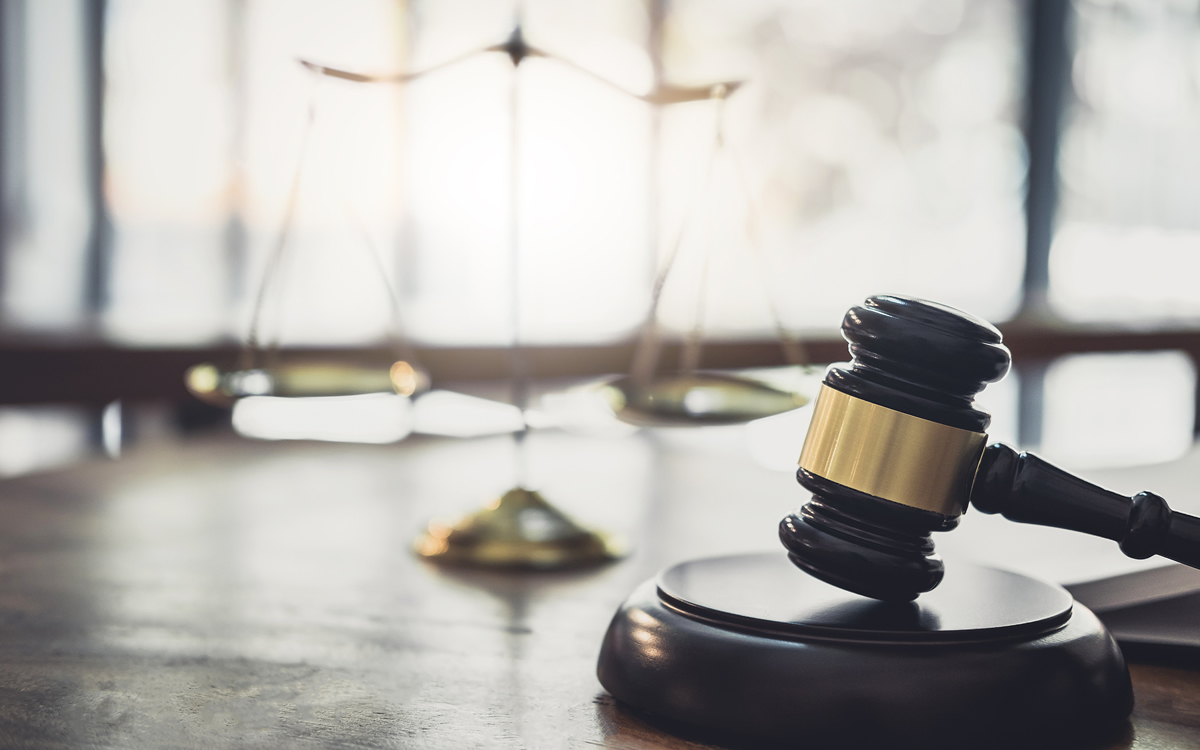
A transgender woman has filed a discrimination complaint with the D.C. Office of Human Rights charging that officials with the Community for Creative Non-Violence homeless shelter refused to allow her to stay in the women’s section of the shelter, forcing her to stay in the men’s sleeping section.
The shelter, located at 425 2nd St., N.W., is one of the city’s largest privately operated homeless services facilities organized by the Community for Creative Non-Violence, which is known as CCNV. It was founded by nationally acclaimed homeless services advocate Mitch Snyder, who passed away in 1990.
The complaint, filed last week by Stephon “Lashawn” Jordan, states that Jordan and a cisgender female friend arrived at the CCNV shelter around 2:30 a.m. on March 22 after they obtained a ride to the shelter through the city’s Emergency Shelter Hotline.
“Upon arrival we were informed that we would have to complete an intake once upstairs at the female housing unit,” Jordan states in the complaint. “Once we arrived a staff member came out. The staff member stated to me that we don’t house transgender individuals in this unit and that I would have to go down to the male shelter unit,” the complaint says.
It says Jordan’s female friend told the staff member she was not going to leave her friend, who identifies as female, by herself in another location at the shelter. “The staff member did not want to hear it and said that both of you can go downstairs too,” the complaint says. “Once we got downstairs to the male shelter unit we asked to speak with a supervisor,” it says.
“Someone came, but the decision was that myself and my friend could go and sleep in the male housing unit,” the complaint states. “During our stay it was very humiliating especially using the restroom,” it concludes.
A spokesperson for the CCNV shelter did not immediately respond to a phone and email message left by the Washington Blade asking for a response to the complaint.
Transgender rights advocates, including D.C. trans activist Earline Budd, who assisted Jordan in filing the complaint, have said the denial of placement of a transgender woman in the female section of a place of public accommodation such as a homeless shelter is a violation of the D.C. Human Rights Act’s ban on gender identity discrimination.
The Office of Human Rights website explains that under its policy for responding to discrimination complaints, the complainant and the accused party are required to enter mediation to determine if the complaint can be resolved. If the mediation fails, the OHR website statement says, a full investigation is conducted that can take up to six months to complete. It says upon completion of the investigation, the office makes a determination of whether probable cause exists that discrimination occurred.
If probable cause is found, the case is sent to the D.C. Commission on Human Rights, which holds a public evidentiary hearing with witnesses before making a final decision on whether discrimination occurred.



